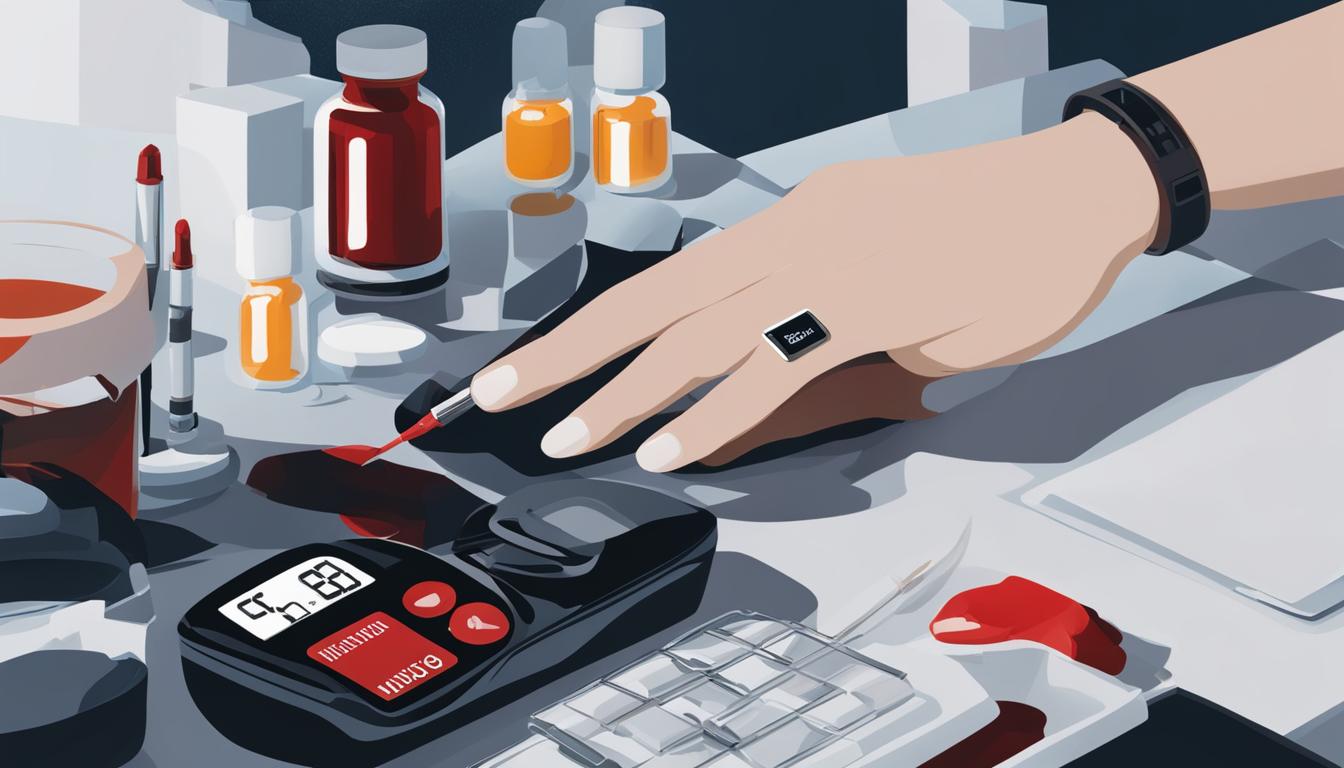
Testosterone replacement therapy (TRT) is a treatment option for men with low testosterone levels. It involves the administration of testosterone to increase levels in the body. Diabetes is a chronic condition characterized by high blood sugar levels. There is a link between testosterone levels and diabetes, as low testosterone levels have been associated with an increased risk of developing diabetes. TRT may have a potential role in managing diabetes and improving overall health outcomes.
Key Takeaways:
- Testosterone replacement therapy (TRT) is a treatment option for men with low testosterone levels.
- Diabetes is a chronic condition characterized by high blood sugar levels.
- Low testosterone levels have been linked to an increased risk of developing diabetes.
- TRT may help improve insulin sensitivity, glucose control, and body composition.
- Individualized treatment plans and close monitoring are important for maximizing benefits and minimizing risks.
The Relationship Between Testosterone and Diabetes
Research has shown that there is a link between testosterone levels and the risk of developing diabetes. Low testosterone levels have been associated with an increased risk of diabetes in men. In fact, a study found that men with low testosterone levels were more likely to have diabetes compared to those with normal levels.
Testosterone plays a crucial role in various factors related to diabetes, such as glucose metabolism, insulin sensitivity, and body weight regulation. When testosterone levels are low, these factors may be adversely affected, increasing the risk of developing diabetes. On the other hand, hormone replacement therapy, such as testosterone replacement therapy (TRT), has the potential to improve insulin sensitivity and glycemic control in individuals with diabetes.
By optimizing testosterone levels through TRT, it may be possible to positively impact glucose control, reduce the risk of complications associated with diabetes, and improve overall health outcomes. However, it is important to note that TRT should only be used under the supervision of a healthcare professional who specializes in hormone therapy. Monitoring testosterone levels and adjusting treatment accordingly is crucial to avoid excessive levels and potential adverse effects.
Risks and Considerations
- TRT should be used under the supervision of a healthcare professional.
- Excessive testosterone levels may lead to adverse effects.
- Potential interactions between testosterone therapy and existing diabetes medications should be considered.
- Regular monitoring and close communication with healthcare providers are essential to minimize risks.
Benefits of Testosterone Replacement Therapy for Diabetes Management

Testosterone replacement therapy (TRT) offers potential benefits for individuals with diabetes, aiding in their diabetes management and overall health outcomes. This hormone therapy has been shown to improve insulin sensitivity, glucose control, and glycemic management, all crucial factors in diabetes treatment.
In addition to enhancing insulin sensitivity, TRT may also have positive effects on body composition. It has been observed to reduce body fat and increase lean muscle mass. These improvements in metabolic health can contribute to better diabetes management and potentially reduce the risk of complications associated with the disease.
Testosterone Replacement Therapy and Diabetes
Studies have suggested that TRT can play a role in enhancing the overall well-being of individuals with diabetes. By addressing low testosterone levels, this therapy may provide added benefits beyond blood sugar control and insulin management. It is important to note that TRT should always be used under the supervision of a healthcare professional specializing in hormone therapy. Regular monitoring of testosterone levels and close communication with the healthcare provider are necessary to optimize treatment outcomes and minimize risks. Testosterone and diabetes
Considerations and Risks of Testosterone Replacement Therapy for Individuals with Diabetes
When considering testosterone replacement therapy (TRT) for individuals with diabetes, it is important to be aware of certain considerations and potential risks. TRT is a hormone therapy that should only be used under the supervision of a healthcare professional who specializes in hormone therapy for low testosterone.
One important consideration is the need for regular monitoring of testosterone levels to ensure they are within a safe and optimal range. Excessive levels of testosterone can lead to adverse effects such as acne, mood swings, and an increased risk of blood clots. Adjustments to the treatment may need to be made based on individual hormone levels.
Additionally, individuals with diabetes should be cautious of potential interactions between testosterone therapy and their existing diabetes medications. It is crucial to discuss this with a healthcare provider to ensure that the combination of treatments does not have any detrimental effects on blood sugar control or other aspects of diabetes management.
It is also important to note that while TRT may have potential benefits for individuals with diabetes, it is not a standalone solution. It should be part of a comprehensive approach to diabetes management, including lifestyle modifications and regular monitoring of blood sugar levels. Close communication and collaboration with healthcare providers are essential to minimize risks and optimize treatment outcomes.
The Risks and Considerations of TRT for Individuals with Diabetes:
- TRT should only be used under the supervision of a healthcare professional specializing in hormone therapy.
- Regular monitoring of testosterone levels is necessary to avoid excessive levels and potential adverse effects.
- Potential interactions between testosterone therapy and diabetes medications should be discussed with a healthcare provider.
- TRT should be part of a comprehensive approach to diabetes management and not a standalone solution.
It is important to approach TRT for individuals with diabetes with caution and carefully weigh the potential benefits against the risks. Working closely with healthcare professionals and following their guidance is essential for safe and effective treatment.
Testosterone Replacement Therapy Options for Diabetes Patients
When it comes to testosterone replacement therapy (TRT) for individuals with diabetes, there are various options available. One common method of administering TRT is through injections. These injections are typically given on a weekly or biweekly basis, under the supervision of a healthcare professional.
TRT injections are an effective way to deliver testosterone into the body and restore optimal levels. The dosage and frequency of injections may vary depending on individual needs and response to treatment. It is important to follow the prescribed protocol and receive injections under medical supervision to ensure safety and effectiveness.
By opting for TRT injections, individuals with diabetes can benefit from the convenience and efficacy of this treatment method. It allows for precise control over the dosage and administration, leading to consistent results. Regular monitoring and communication with healthcare providers are essential to ensure the therapy is optimized for each patient’s specific needs.

Advantages of TRT Injections:
- Accurate dosage control
- Consistent administration
- Convenience for patients
- Effective testosterone delivery
“TRT injections offer a reliable and efficient way to deliver testosterone to individuals with diabetes, helping to restore optimal hormone levels and improve overall health outcomes.”
Overall, TRT injections provide a viable and effective option for individuals with diabetes who require testosterone replacement therapy. It is important to consult with a healthcare professional to determine the most suitable treatment plan and ensure proper monitoring and supervision throughout the therapy.
Lifestyle Factors and Testosterone Levels in Diabetes Management
When it comes to managing diabetes and optimizing testosterone levels, lifestyle modifications play a crucial role. Incorporating healthy habits into your daily routine can have a positive impact on both your testosterone levels and your overall glycemic control.
A regular exercise routine is essential for maintaining optimal testosterone levels. Engaging in physical activity, such as weightlifting or high-intensity interval training, can help stimulate testosterone production and improve insulin sensitivity. Aim for at least 150 minutes of moderate-intensity exercise or 75 minutes of vigorous-intensity exercise per week, in accordance with the American Diabetes Association’s recommendations.
A well-balanced diet is another key aspect of managing diabetes and supporting healthy testosterone levels. Include plenty of fruits, vegetables, whole grains, lean proteins, and healthy fats in your meals. Avoid processed foods, sugary drinks, and excessive consumption of alcohol, as they can negatively impact both testosterone levels and glycemic control.
Stress management and adequate sleep are also crucial for maintaining optimal testosterone levels. Chronic stress can lead to hormonal imbalances, including decreased testosterone production. Implement stress-reducing techniques, such as meditation, deep breathing exercises, or engaging in hobbies you enjoy. Ensure you are getting enough restorative sleep each night, as sleep deprivation can affect testosterone production and insulin sensitivity.
Key Points:
- Incorporate regular exercise, such as weightlifting or high-intensity interval training, to stimulate testosterone production and improve insulin sensitivity.
- Follow a well-balanced diet rich in fruits, vegetables, whole grains, lean proteins, and healthy fats, while avoiding processed foods, sugary drinks, and excessive alcohol consumption.
- Implement stress management techniques, such as meditation or engaging in hobbies, and ensure you are getting enough quality sleep each night.
The Importance of Individualized Treatment Plans
When it comes to managing diabetes and optimizing hormone therapy, a personalized treatment plan is essential. We understand that each person’s needs and response to treatment may vary, and that’s why an individualized approach is crucial. By conducting a comprehensive assessment, including medical history, hormone levels, and overall health status, we can tailor the treatment plan to your specific needs.
By taking the time to create a personalized treatment plan, we can optimize your outcomes and ensure that you receive the most effective and appropriate hormone therapy for your diabetes management. This individualized approach takes into account all aspects of your health and ensures that your treatment aligns with your specific goals and needs.
It’s important to remember that hormone therapy is just one part of a comprehensive approach to diabetes management. Alongside personalized treatment, lifestyle modifications, such as regular exercise, a healthy diet, stress management, and adequate sleep, play a critical role in optimizing your testosterone levels and overall glycemic control. By incorporating these lifestyle factors into your treatment plan, we can work together to achieve the best possible outcomes.
At our clinic, we prioritize your health and well-being. We believe in the power of personalized treatment plans to optimize your diabetes management and hormone therapy. By working closely with our team of healthcare professionals, we can ensure that you receive the individualized care you deserve.
Conclusion
In summary, testosterone replacement therapy (TRT) has shown promise in the management of diabetes and improving overall health outcomes. Studies have indicated a link between low testosterone levels and an increased risk of developing diabetes. By increasing testosterone levels, TRT may help improve insulin sensitivity, glucose control, and body composition, ultimately contributing to better diabetes management.
However, it is crucial to approach TRT with caution and under the guidance of healthcare professionals specializing in hormone therapy. Regular monitoring of testosterone levels and close communication with healthcare providers are essential to minimize risks and optimize treatment outcomes.
It is important to remember that TRT should be part of a comprehensive approach to diabetes management, which includes lifestyle modifications such as regular exercise, a healthy diet, stress management, and adequate sleep. These lifestyle factors can complement the effects of TRT and contribute to overall well-being.
In conclusion, testosterone replacement therapy has the potential to play a valuable role in the management of diabetes. By considering individual factors, working closely with healthcare professionals, and adopting a personalized treatment plan, individuals with diabetes can maximize the benefits of TRT and enhance their overall health and well-being.
FAQ
What is testosterone replacement therapy (TRT)?
Testosterone replacement therapy
is a treatment option for men with low testosterone levels. It involves administering testosterone to increase levels in the body.
Is there a link between testosterone levels and diabetes?
Yes, research has shown that low testosterone levels may increase the risk of developing diabetes. Hormone replacement therapy, such as TRT, may help improve insulin sensitivity and glycemic control in individuals with diabetes.
What are the benefits of testosterone replacement therapy for diabetes management?
Testosterone replacement therapy may help improve insulin sensitivity, glucose control, and overall glycemic management in individuals with diabetes. It can also have positive effects on body composition, including reducing body fat and increasing lean muscle mass.
What considerations and risks should individuals with diabetes be aware of when considering testosterone replacement therapy?
Individuals should work with healthcare professionals to develop a personalized treatment plan for testosterone replacement therapy. Regular monitoring of testosterone levels and potential interactions with diabetes medications is crucial to minimize risks and optimize treatment outcomes.
What are the options for testosterone replacement therapy for diabetes patients?
Testosterone replacement therapy can be administered in various forms, including injections. TRT injections are a common method of delivery and are typically administered weekly or biweekly, under medical supervision.
How do lifestyle factors impact testosterone levels in diabetes management?
Lifestyle modifications, such as regular exercise, a healthy diet, stress management, and adequate sleep, can positively impact testosterone levels and glycemic control in individuals with diabetes.
Why is it important to have individualized treatment plans for testosterone replacement therapy?
Each person’s needs and response to treatment may vary. An individualized approach allows for tailoring the treatment plan to the specific needs of the individual, considering factors such as medical history, hormone levels, and overall health status.
How does testosterone replacement therapy contribute to diabetes management?
Testosterone replacement therapy has the potential to help manage diabetes and improve overall health outcomes. It can improve insulin sensitivity, glucose control, and body composition, but should be part of a comprehensive approach that includes lifestyle modifications and regular monitoring of blood sugar levels.
